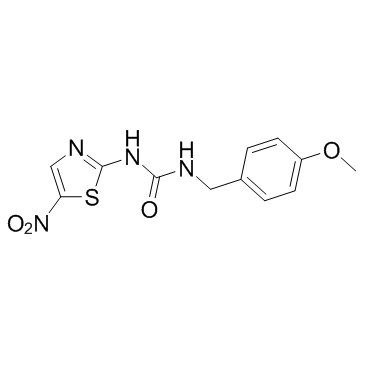AR-A014418

AR-A014418 structure
|
Common Name | AR-A014418 | ||
|---|---|---|---|---|
| CAS Number | 487021-52-3 | Molecular Weight | 308.313 | |
| Density | 1.5±0.1 g/cm3 | Boiling Point | N/A | |
| Molecular Formula | C12H12N4O4S | Melting Point | 208-210?C (dec.) | |
| MSDS | Chinese USA | Flash Point | N/A | |
| Symbol |


GHS05, GHS07 |
Signal Word | Danger | |
|
Blockage of GSK3β-mediated Drp1 phosphorylation provides neuroprotection in neuronal and mouse models of Alzheimer's disease.
Neurobiol. Aging 36(1) , 211-27, (2014) It is well established that mitochondrial fragmentation plays a key role in the pathogenesis of Alzheimer's disease (AD). Mitochondrial fission is mediated by dynamin-related protein 1 (Drp1), which is highly expressed in nervous system and regulated by vario... |
|
|
Thr175-phosphorylated tau induces pathologic fibril formation via GSK3β-mediated phosphorylation of Thr231 in vitro.
Neurobiol. Aging 36 , 1590-9, (2015) We have previously shown that amyotrophic lateral sclerosis with cognitive impairment can be characterized by pathologic inclusions of microtubule-associated protein tau (tau) phosphorylated at Thr(175) (pThr(175)) in association with GSK3β activation. We hav... |
|
|
Signal transducers and activators of transcription 3-induced metastatic potential in gastric cancer cells is enhanced by glycogen synthase kinase-3β.
APMIS 123 , 373-82, (2015) The transcription factor signal transducers and activators of transcription 3 (STAT3) can promote cancer metastasis, but its underlying regulatory mechanisms in gastric cancer cell invasiveness still remain obscure. We investigated the relationship between ST... |
|
|
Glycogen synthase kinase-3 inhibitor AR-A014418 suppresses pancreatic cancer cell growth via inhibition of GSK-3-mediated Notch1 expression.
HPB (Oxford.) 17 , 770-6, (2015) Glycogen synthase kinase-3 (GSK-3) can act as either a tumour promoter or suppressor by its inactivation depending on the cell type. There are conflicting reports on the roles of GSK-3 isoforms and their interaction with Notch1 in pancreatic cancer. It was hy... |
|
|
Glycogen synthase kinase 3beta-mediated serine phosphorylation of the human glucocorticoid receptor redirects gene expression profiles.
Mol. Cell. Biol. 28(24) , 7309-22, (2008) Aberrant glycogen synthase kinase 3beta (GSK-3beta) activity is associated with the progression of several pathological conditions such as diabetes, Alzheimer's, and cancer. GSK-3beta regulates cellular processes by directly phosphorylating metabolic enzymes ... |
|
|
miR-98 and let-7g* protect the blood-brain barrier under neuroinflammatory conditions.
J. Cereb. Blood Flow Metab. 35 , 1957-65, (2015) Pathologic conditions in the central nervous system, regardless of the underlying injury mechanism, show a certain level of blood-brain barrier (BBB) impairment. Endothelial dysfunction is the earliest event in the initiation of vascular damage caused by infl... |
|
|
TCF/beta-catenin plays an important role in HCCR-1 oncogene expression.
BMC Mol. Biol. 10 , 42, (2009) Oncogene HCCR-1 functions as a negative regulator of the p53 and contributes to tumorigenesis of various human tissues. However, it is unknown how HCCR-1 contributes to the cellular and biochemical mechanisms of human tumorigenesis.In this study, we showed ho... |
|
|
Glycogen Synthase Kinase-3beta regulates Snail and beta-catenin during gastrin-induced migration of gastric cancer cells.
J. Mol. Signal. 5 , 9, (2010) The gastrointestinal peptide hormone gastrin is known to regulate various cellular processes including proliferation, migration and metastasis in gastrointestinal (GI) cells. The studies described here were undertaken to elucidate in detail the signaling path... |
|
|
Corticosterone rapidly increases thorns of CA3 neurons via synaptic/extranuclear glucocorticoid receptor in rat hippocampus.
Front. Neural Circuits 7 , 191, (2013) Modulation of synapses under acute stress is attracting much attention. Exposure to acute stress induces corticosterone (CORT) secretion from the adrenal cortex, resulting in rapid increase of CORT levels in plasma and the hippocampus. We tried to test whethe... |
|
|
Glycogen synthase kinase-3 inhibition sensitizes pancreatic cancer cells to TRAIL-induced apoptosis.
PLoS ONE 7 , e41102, (2012) Tumor necrosis factor-related apoptosis inducing ligand (TRAIL) induces apoptosis in a variety of cancer cell lines with little or no effect on normal cells. However, its effect is limited as some cancers including pancreatic cancer show de novo resistance to... |